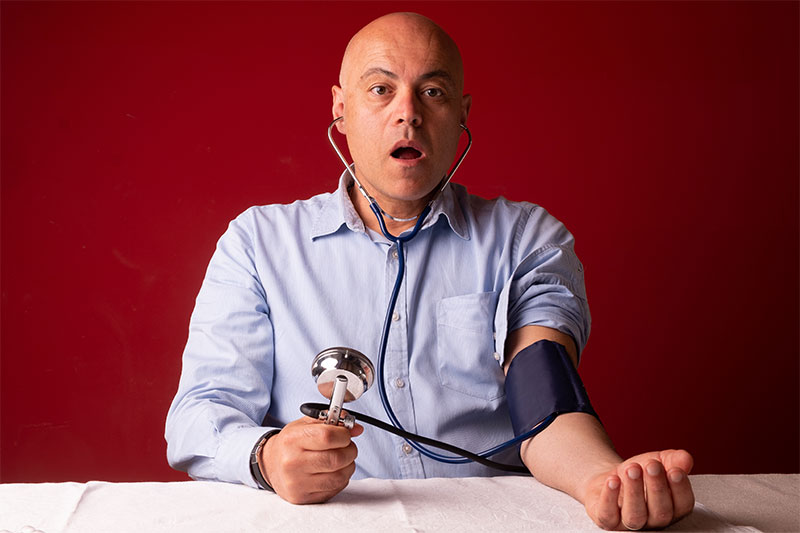
Have you ever considered that a simple tweak in your diet could be as powerful as pressure medication for managing hypertension? Imagine the possibility of reducing your blood pressure numbers by doing something as effortless as cutting back on salt. It’s no secret that hypertension, or high blood pressure, is a silent adversary affecting millions, but recent studies suggest that taking just one teaspoon less salt daily could make a significant difference. This revelation could be a game-changer for many, offering a beacon of hope for those seeking natural alternatives to pharmaceuticals.
In our quest for good health, we often overlook the everyday ingredients that have a profound impact on our well-being. Salt, the ubiquitous seasoning found in nearly every kitchen, has a more complex relationship with our bodies than we might think. A study has now thrown light on this connection, equating the benefits of a modest reduction in salt intake to those of hypertension medications. The analogy couldn’t be clearer: just as a small key can open a large door, a tiny reduction in salt could unlock a healthier blood pressure level. Join us as we delve into the details of this groundbreaking research, exploring how a pinch less could mean a leap forward in hypertension management.
The Ripple Effect of Salt on Your Health
Why does salt have such a profound impact on our blood pressure? To understand this, we must dive into the physiology of our bodies. Salt—or sodium chloride—is essential for maintaining fluid balance and nerve function. However, too much salt can lead to an increase in blood volume, making the heart work harder and increasing pressure on the arteries. But how much is too much? According to the American Heart Association, consuming more than 2,300 milligrams of sodium a day can be detrimental to your health, and they recommend aiming for no more than 1,500 milligrams for most adults.
Small Steps to Big Changes
Reducing your salt intake by just one teaspoon, equivalent to about 2,300 milligrams of sodium, may seem like a drop in the ocean. Yet, this small step can lead to a significant decline in blood pressure levels, especially in individuals with hypertension. The question is, how can we achieve this reduction without sacrificing flavor or turning meal preparation into a chore?
Creative Seasoning Alternatives
The answer lies in getting creative with herbs and spices. Nature offers a bounty of flavor-enhancing options that can easily replace salt. Think about using garlic, onion, basil, oregano, paprika, and lemon zest to bring your dishes to life. These not only impart a burst of flavor but also come with their own health benefits. For instance, garlic is known for its anti-inflammatory properties, while lemon zest can provide a dose of vitamin C.
Reading Labels: A Hidden Salt Minefield
Another key strategy is to become a savvy shopper. Processed foods are notorious for their high sodium content, often hidden under names like monosodium glutamate (MSG), sodium nitrate, or baking soda. Start reading labels and opt for low-sodium or no-salt-added versions of your favorite products. And remember, fresh is best! Incorporating more fresh fruits and vegetables into your diet not only reduces your sodium intake but also increases your potassium levels, which can help counteract the effects of sodium on blood pressure.
Real-Life Success Stories
It’s always inspiring to hear about people who’ve successfully managed their hypertension through lifestyle changes. Take John, for example, a 54-year-old who was able to reduce his systolic blood pressure by 15 points after he started cooking at home more often, using fresh ingredients and mindful seasoning. Or Maria, a 62-year-old who swapped out canned soups for homemade versions and saw a noticeable improvement in her blood pressure readings within weeks.
Understanding the Science Behind the Study
Let’s delve deeper into the study that sparked this enlightening discussion. Conducted by a reputable institution, researchers compared the effects of reduced sodium intake with the efficacy of common antihypertensive medications. The results were astonishing, showing that a modest decrease in daily salt consumption could lead to similar improvements in blood pressure as those achieved by drugs, particularly in individuals with elevated levels. This finding underscores the potential of dietary interventions in the fight against hypertension.
Expert Insights on Sodium Reduction
Leading health experts have long advocated for a reduction in sodium intake as part of a comprehensive approach to managing high blood pressure. Dr. Jane Heartwell, a renowned cardiologist, emphasizes the importance of patient education in this area. “Patients need to understand that their lifestyle choices, including diet, exercise, and stress management, play a critical role in controlling hypertension,” she says. “Reducing salt intake is a manageable and effective strategy that can complement other treatments.”
Is Less Salt the Answer for Everyone?
While cutting back on salt can benefit most people, it’s important to recognize that individual responses to sodium reduction can vary. Some may experience dramatic improvements, while others may see more modest changes. Consulting with a healthcare provider before making any significant dietary adjustments is crucial, especially for those on medication or with underlying health conditions.
The Bigger Picture: A Holistic Approach to Health
Managing hypertension effectively often requires a holistic approach. Besides monitoring salt intake, maintaining a healthy weight, engaging in regular physical activity, and moderating alcohol consumption are all vital components of blood pressure control. Additionally, stress reduction techniques such as meditation, deep breathing exercises, or yoga can have a positive impact on both your mental and physical health.
Embrace the Journey to Better Health
Embarking on a journey to better health doesn’t have to be daunting. Every small change you make can have a cumulative effect, leading to improved well-being. So why not start today? Challenge yourself to take that first step—whether it’s swapping out your salt shaker for a spice blend, opting for fresh produce over canned goods, or simply being more mindful of the sodium content in your food choices.
Remember, managing hypertension is not just about avoiding medication; it’s about embracing a lifestyle that promotes overall health and longevity. By taking control of your diet, you’re not only working towards normalizing your blood pressure but also setting the stage for a healthier, more vibrant life. So, are you ready to unlock the secret to managing hypertension? Your journey to wellness begins with that single teaspoon of salt.



